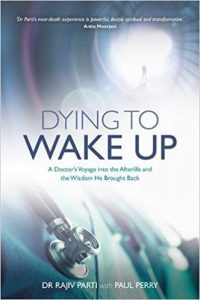Book review by David Lorimer
DYING TO WAKE UP
Dr Rajiv Parti with Paul Perry
Hay House, 2016, 222 pp.
ISBN: 978-1-78180-726-2
This extraordinary story joins the likes of Proof of Heaven by Dr Eben Alexander and Dying to be Me by Anita Moorjani as a classic of recent NDE literature and with the same essential message of healing, love and wisdom. It is as if the spiritual world is trying to wake us up to the wider and deeper context of life, as the title of this book suggests. In this particular case, Dr Parti was steeped in materialistic values, with his large mansion and expensive cars, living a high-pressure lifestyle as a successful cardiac anaesthetist. He had effectively sacrificed his health and humanity for material advancement at any cost. The book begins with the poignant story of a patient’s NDE, which Parti disregarded in his normal fashion, an experience he himself has after waking up from a very serious seventh operation when he was dying from sepsis and a 105° fever. However, he surprised his surgeon by reporting a joke he had made while Parti was ostensibly unconscious. After his experience, he realises how callous he has been with many of his patients, hurrying them on so that he can check his stock market position.
His journey in the other realms was dramatic. He realises how materialistic and selfish he has been and how he has continued a pattern of pressure and abuse on his eldest son, just as he had experienced and his father before him. He now has an opportunity to break this cycle of anger, and is told that the Universe will take care of him if he is truthful to his own self, God and the Divine. He is taken aback to encounter his father, with whom he had a difficult relationship but he comes to understand better in the light of his own experience. Very unusually, he has memories of two previous lives with connections to his current patterns in terms of abuse and addiction. He learns that these experiences are the raw material of his capacity to change his medical practice to what he calls consciousness-based healing, becoming a healer of the soul.
He receives his most important guidance from what he perceives to be the archangels Michael and Raphael in which he is told that the pure love and intelligence he is experiencing ‘is the basic reality, the underlying fabric, of everything in the universe. It is the source of all creation, the creative force of the universe.’ They tell him that enlightenment comes when a person realises that love is everywhere and is the only thing that matters, commenting that ‘most don’t reach that realisation until they leave the Earth.’ Hence the importance of this message for the reader, and it is one emphasised equally by Eben Alexander and Anita Moorjani.
This experience has an immediate and lasting effect on Parti’s professional and personal life, and his wife Arpana turns out to be incredibly supportive once she has come to terms with the implications for her family – they downsize the house and get rid of the expensive cars; he resigns his position in the hospital, to the amazement of his colleagues, and begins to construct his new life. On his first day free from hospital commitments, he holds a funeral for his old self and writes a series of three extraordinary letters to God, his father and himself along with a poem about love for his wife. Like Eben, Parti finds that meditation gives him access to a continuing source of guidance, and he articulates seven points of what he calls his Near Death Manifesto, affirming a spiritual view of life.
For him, death proves to be an awakening, and he applies his own principles of forgiveness, love and healing to his relationships, especially with his son, whom he had been pressuring to follow his footsteps into medicine. He also draws a series of five lessons from the light. During this period, he is trying to help his friend Naresh, who has cancer, apply the same insights. Naresh does die in the end, but his death is an opening into a remarkable shared death experience. In the process of the story, Parti has discovered his religion – kindness and love – and his calling as a healer performing what the Indians call seva, service with gratitude, work offered to God.
There is one serious error in the book, which I have notified to the publisher so that it can be corrected in future editions. Parti (p. 123) says that Jung had an NDE in 1913, around the time of his break with Freud. It is true to say that Freud regarded spiritual experiences as fantasies, but the experience he refers to took place in 1944, and did indeed lead to an important expansion of Jung’s work.
The book conveys an essential and inspiring message, which we can all apply to our lives without having to undergo an NDE ourselves.
Buy Dying to Wake Up here.